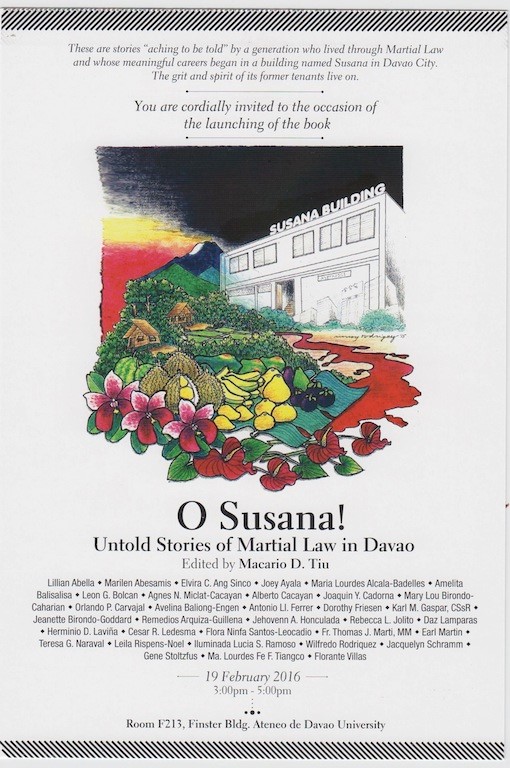“O Susana! The Untold Stories of Martial Law in Davao” was launched last Feb. 19 at F213 of Ateneo de Davao University. It has sold 450 copies on its launch date, setting a record for book launchings in Davao City, according to Dr. Macario Tiu, Director of the said university’s Publication Office, the book’s publisher.
Tiu, a historian, professor, and a four-time Palanca awardee, is also the editor of “O Susana” written by 34 church and social development workers who were in their 20s and 30s during Martial Law. Tiu, at the time, was one of the thousands of political detainees in the Marcos regime.
The book’s writers, the “Susanistas”, are “alumni” of the wooden two-storey Susana Building offices in the 1970s, where according to one of the writers, Redemptorist Brother Karl Gaspar, CSsR, was “constantly under the surveillance of the agents of Marcos’ authoritarian rule.” Most of its occupants “remained actively engaged in various social and ecological advocacies” even after the People Power revolt that toppled the Marcos dictatorship happened on February 25, 1986.
“We were very young then… not as if we were carrying guns,” Gaspar, who was also a political detainee, said, “but Martial Law made you subversive just because you said the word ‘Justice’ and sang ‘Bayan ko.’”
With the writers already in their 60s and 70s today, they aim to give the present and future generations a clearer picture “how oppressive martial rule was, and to share our reflections on how those times have greatly influenced what we have become.”
In the book’s introduction, Tiu wrote that “revisionist histories are being written that seek to glorify the Marcos Dictatorship,” with them hearing “naïve views from some younger generations stating that the Marcos dictatorship did good for the country.” He emphasized on the poverty incidence that worsened from 41 percent in 1965 to 58.9 percent in 1985, as reported by Nonoy V.
In the editor’s introduction of the book, he mentions those who initiated and pushed through the project, Susanistas’ “Tres Marias”, namely Len Abesamis, Jet Birondo-Goddard, and Agnes Miclat-Cacayan.
“We, ‘Tres Marias’, invited the Sustanistas to workshops where sharing of stories took place along with short writing exercises to hone our writing skills,” Jeanette Birondo-Goddard shared. She said the entire process took them two years. “Being busy people, mostly senior citizens with growing families and ‘new’ advocacies, some even living in the State and [in] Manila, our schedules had to be synchronized.”
“I feel a responsibility to the thousands of victims of the Marcos dictatorship to let this new generation realize the ugliness, the brutality and evil of Martial Law. Can the young even imagine what it is like to have our freedoms curtailed, news media controlled and being arrested without due process of law, many tortured and killed for resisting tyranny?” Goddard asked.
“As an educator, I am disturbed by the fact that this dark period of Philippine history is not discussed or written extensively in our history books. What better contribution could there be to correct an omission –even distortion—of history but for dedicated people like the Susanistas to tell their stories, told with integrity, courage and honesty? As our Chief Editor, Dr. Macario Tiu says in his introduction, this is ‘their best gift to the country’. Indeed, it is!” she said.
The book’s writers are Lilian Abella, Marilen Abesamis, Elvira Ang Sinco, Joey Ayala (his songs from that period), Lourdes Badelles, Amelita “Melot” Balisalisa, Leon Bolcan, Alberto Cacayan, Agnes Miclat-Cacayan, Joaquin Cadorna, Marilou B. Caharian, Orlando Carvajal, Avelina Baliong-Engen, Antonio Ll. Ferrer, Dorothy Friesen, Karl Gaspar, Jeanette Birondo-Goddard, Remedios Arquiza-Guillena, Jehovenn Honculada, Rebecca Jolito, Daz Lamparas, Herminio Lavina, Cesar Ledesma, Flora S. Leocadio, Fr. Tom Marti, MM, Earl Martin, Teresa Naraval, Iluminada Ramoso, Leila Noel-Rispens, Wilfredo “Nonoy” Rodriguez, Jacquelyn Schramm, Gene Stolfus, Ma. Lourdes Tiangco and Florante Villas.
